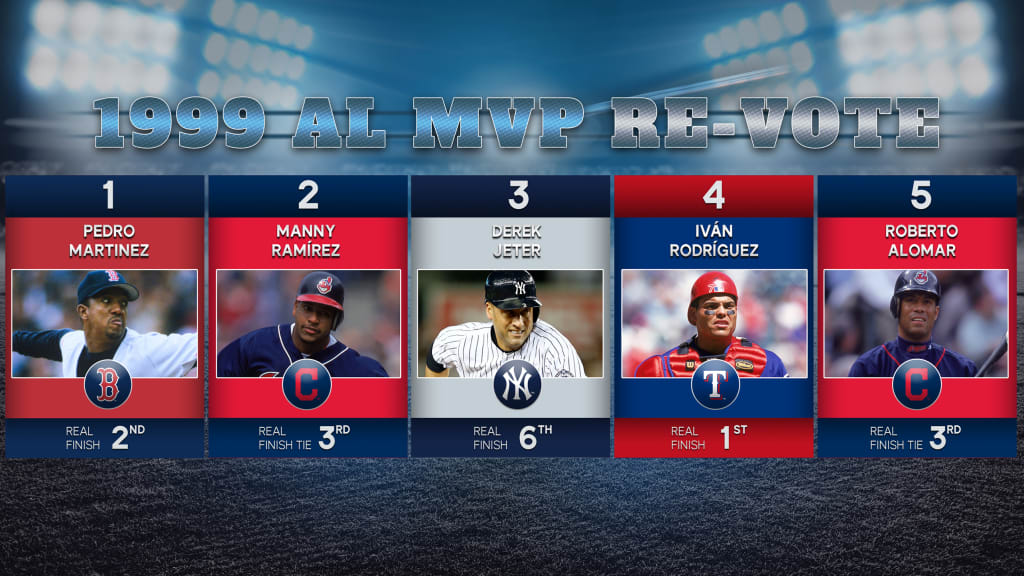
The annual awards voted on by the Baseball Writers' Association of America often produce solid debate material. The 1999 American League Most Valuable Player Award vote took that to a whole new level.
Every MVP ballot contains a list of criteria for the award, one of which is “actual value of a player to his team, that is, strength of offense and defense.” No. 2 on the list is “number of games played,” which can work against pitchers under consideration. Still, the ballot also notes that there is “no clear-cut definition” of most valuable, adding that it is “up to the individual voter” to decide who was the MVP for their league.
With regard to the controversial 1999 AL MVP vote, the following sentence on the ballot proved to be the most important:
Keep in mind that all players are eligible for MVP, including pitchers and designated hitters.
Iván “Pudge” Rodríguez emerged as the winner in a tight race, beating Pedro Martinez by 13 points. Martinez received the most first-place votes with eight, one of six players named in the top spot on at least one of the 28 ballots.
Martinez’s Triple Crown season was legendary; he went 23-4 with a 2.07 ERA and 313 strikeouts against just 37 walks in 213 1/3 innings. He was a unanimous winner in the AL Cy Young Award race, but when the MVP results were revealed, he was a surprising runner-up to Rodríguez, who wasn’t even named the Rangers’ MVP that season by the BBWAA’s Dallas-Fort Worth chapter.
So how did Pudge win?
Two voters left Martinez off their ballot altogether, costing him the necessary points to claim the award. Had Martinez received one more first-place vote or been voted fourth or higher by the pair, he would have won.
One voter said he was “not a pitcher-for-MVP kind of guy,” while the other believed Nomar Garciaparra (who actually had a higher WAR than Pudge, though not Pedro) and manager Jimy Williams were more valuable to the Red Sox than Martinez.
In an effort to see whether justice was served, MLB.com gathered 16 of its writers to re-vote on the award with the benefit of hindsight. Knowing what we know today about the way players are valued, would the results differ?
The scoring used was the same as the BBWAA’s: A first-place vote is worth 14 points. From second through 10th, the ballot spots are worth 9-8-7-6-5-4-3-2-1 points, respectively. And to keep the re-vote based somewhat in the reality of 1999, voters were only allowed to consider the 19 players who received MVP votes that year.
The real top 5
- Ivan Rodriguez, C, TEX
- Pedro Martinez, SP, BOS
T-3) Roberto Alomar, 2B, CLE
T-3) Manny Ramirez, RF, CLE - Rafael Palmeiro, DH/1B, TEX
The “new” top 5
- Pedro Martinez, SP, BOS
- Manny Ramirez, RF, CLE
- Derek Jeter, SS, NYY
- Iván Rodríguez, C, TEX
- Roberto Alomar, 2B, CLE
THAT WAS THEN …
Martinez’s 1999 season ranks among the best ever by a pitcher, especially in an offensive era that saw numbers bloat to video-game proportions. Consider this: Of the 13 hitters that placed in the top 15 of the actual vote more than two decades ago, all had at least 100 RBIs and an OPS of at least .900, while nine of them had 30-plus home runs.
To put Martinez’s season in perspective, his 2.07 ERA was well more than a run lower than David Cone, who was second in the AL with a 3.44 mark. Pedro’s 23 wins were five more than any other pitcher in the AL, while his 313 strikeouts were 113 more than Chuck Finley, who was the only other AL hurler to register 200 K's that season.
Even in a season marked by great offensive numbers, Rodriguez ranked 11th in homers, 14th in RBIs, seventh in batting average and 19th in OPS. Pudge’s defensive excellence certainly helped his cause; he threw out 54.7% of would-be basestealers to lead the league, controlling the opposing running game as well as any catcher in history.
Perhaps Martinez was penalized by the fact that the 94-win Red Sox didn’t win the AL East, finishing four games behind the Yankees to claim the league’s Wild Card berth. But Jeter (one first-place vote) finished sixth in the vote, the highest of any Yankees player that season (Bernie Williams and Mariano Rivera received some down-ballot votes).
Rodriguez -- who became just the fourth player to win the MVP without getting the most first-place votes -- split votes with teammate Palmeiro, who was voted as Texas’ MVP by local writers following the Rangers’ 95-win season that resulted in an AL West title. (The Rangers ended up getting swept by the Yankees in the AL Division Series.)
Pudge had seven first-place votes to Palmeiro’s four, while Indians teammates Alomar and Ramirez also received four apiece after Cleveland took the AL Central with 97 wins. Alomar and Ramirez finished tied for third, while Palmeiro came in fifth in the vote.
BIGGEST GAINERS IN THE RE-VOTE
Martinez is the obvious big winner, finishing first after receiving 13 of the 16 first-place votes. The others went to Ramirez (2) and Alomar (1), while all three of those ballots had Martinez listed second. In the actual 28-ballot vote, Martinez received 18 votes between second and seventh, while two left him off altogether.
Jeter, who finished sixth in the 1999 vote, placed third in the re-vote, earning six seconds and six thirds, coming in no lower than fifth on any ballot. His 8.0 WAR that season was his career best, and in retrospect it’s somewhat surprising that a player of his stature didn’t fare better. His best MVP finish came in 2006, when he posted 5.6 WAR and was second to Justin Morneau.
While Martinez’s first-place finish in the re-vote is the most significant jump, the biggest climb belongs to Omar Vizquel. The slick-fielding shortstop finished 16th in voting back in ’99, but he came in 11th this time, the greatest change for any player.
Ramirez (T-3 to 2), Garciaparra (7 to 6), Shawn Green (9 to 8) and Ken Griffey Jr. (10 to 9) each climbed one spot in the new voting.
BIGGEST FALLERS IN THE RE-VOTE
Not only did Rodriguez lose out to Martinez in our re-vote, but Pudge didn’t even earn a top-three finish. With Pedro, Manny and Jeter making up the top three, Rodriguez finished fourth, failing to receive even one first-place vote.
In the actual vote, Rodriguez was listed up and down ballots, receiving seven firsts, six seconds, seven thirds, five fifths, two sixths and one seventh.
Pudge was named on all 16 of our new ballots, though none had him listed first. He had one second and three thirds, but eight of his votes (50%) came in the No. 4 spot, which is where he ultimately finished in the overall re-vote.
Rodriguez’s three-spot drop was the biggest fall for any player on the ballot. Alomar fell from a third-place tie to fifth, while Palmeiro (5 to 7) and Jason Giambi (8 to 10) each dropped two spots. Williams, Carlos Delgado, Juan Gonzalez and Rivera, who finished 12th through 15th, respectively, each fell one place in the standings in the re-vote.
Alex Rodriguez (15), Matt Stairs (17), John Jaha and B.J. Surhoff (T-18) were not named on any of our 16 ballots.
WHAT HAVE WE LEARNED?
Pudge's season was excellent; hitting 35 homers with 113 RBIs and a .914 OPS is nothing to sneeze at. His .332 batting average was the highest for a catcher since 1936, and his defense behind the plate was as good as any we’ve seen in the modern era.
Yet there was considerable outrage when Rodriguez edged Pedro for the AL MVP Award back in 1999, and based on the results of our re-vote, it was justified.
Winning an MVP as a pitcher is quite difficult, as starting pitchers play in significantly fewer games than everyday players. No pitcher had won an MVP Award since Roger Clemens in 1986, and two -- Justin Verlander (2011) and Clayton Kershaw (2014) -- have done so in the 21 years since.
Given the offensive explosion that year, Martinez’s immaculate season -- one in which he dominated hitters like no other pitcher in the game -- was beyond extraordinary.
